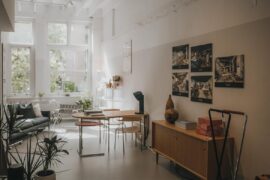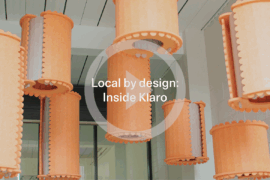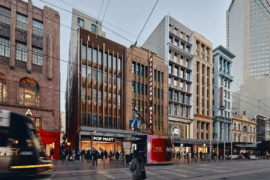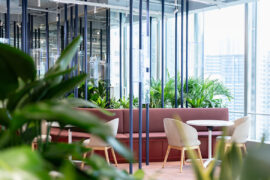Humanscale’s Ergonomic Consulting assists organisations with the development and implementation of cost-effective ergonomics programs. Here we discover their unique approach to improving wellbeing at work.
April 25th, 2018
In 2002, Humanscale, a leading global supplier of stylish and ergonomic office furniture identified a gap in the commercial specification marketplace. Although ergonomics were beginning to inform design and thinking surrounding commercial environments, there remained a gap between problems and the products and solutions addressing these. To rectify this, Humanscale launched Humanscale Consulting, an ergonomics consultancy that specialises in implementing effective ergonomics programs in offices and workplaces. Now an established and globally respected brand, Humanscale Consulting has enhanced work efficiency for over 2000 organisations since 2008, including government agencies and Fortune 500 companies.
In keeping with the excellence and flexibility with which the Humanscale furniture brand is synonymous, Humanscale Consulting draws on the expertise of only the most experienced and qualified ergonomists. Their team of consultants have degrees in Human Factors and Ergonomics alongside numerous peer-reviewed publications and postgraduate experience in office ergonomics. Combining this expertise with passion and knowledge of the latest developments in ergonomics and anthropometry, Humanscale Consulting excel at providing scalable, cost-effective strategies for enhancing worker health and wellbeing.
To ensure that bespoke solutions are tailored to the individual needs of client companies, Humanscale Consulting employs a meticulous 6-step approach to every project. This iterative approach is grounded in a strong client relationship and comprehensive understanding of stakeholder needs, and closely mirrors the research and development process. First, consultants immerse themselves within the client company, getting ‘on the ground’ and experiencing firsthand the needs and challenges present in the workplace. At this stage, they begin to engage key stakeholders and lay the groundwork for an elevated awareness of best practice in ergonomic strategies.
Secondly, Humanscale Consultants investigate key areas or concerns. As certified ergonomists, they are well placed to document and analyse site trends, as well as to perform a comprehensive review of any existing programs that may be in place in the workplace. They also work to develop strategies to ameliorate risk and improve overall employee health and wellbeing.
Following this, consultants work closely with the organisation to set realistic objectives and timelines for implementing ergonomic tactics. Once this is complete, the implementation stage begins in earnest, with Humanscale Consulting providing training, assessing performance, and enhancing the program as necessary. The consultancy also offers clients the opportunity to have their staff educated in office ergonomics via a certification program that builds in-house ergonomics expertise in order to bolster the ergonomics program in practice.
After implementation, Humanscale Consulting remains involved with the program in two key ways. First, they track and analyse data sets and performance indicators to evaluate the effectiveness of the program and suggest adjustments where necessary. Finally, the project enters the ‘support’ stage, where the role of consultants is intermittent and geared toward maintaining the program and ensuring that it remains in force.
Throughout the implementation process, Humanscale Consulting is informed by the knowledge gained during the research and development behind their growing range of products. As a consequence of this informed, rigorous approach, the consultancy has established a strong presence on the global stage as a leader in office space ergonomics. Today, Humanscale Consulting has consultants throughout North America, Europe, and the Asia Pacific alongside partner consultants in major North American cities.
Among the company’s supporters and regular collaborators is Professor Alan Hedge, the Director of the Human Factors and Ergonomic Laboratory and Health Futures Institute at New York’s Cornell University. Widely regarded as one of today’s leading ergonomic thinkers, Professor Hedge’s research and teaching has for years centred upon issues of design and workplace ergonomics and the impact of these on worker health, comfort, and productivity – making him a perfect fit for Humanscale Consulting. Professor Hedge’s expert advice has played an integral role in guiding thinking and strategy devising at Humanscale Consulting, and will no doubt continue to do so for year to come.
INDESIGN is on instagram
Follow @indesignlive
A searchable and comprehensive guide for specifying leading products and their suppliers
Keep up to date with the latest and greatest from our industry BFF's!

Sydney’s newest design concept store, HOW WE LIVE, explores the overlap between home and workplace – with a Surry Hills pop-up from Friday 28th November.

In an industry where design intent is often diluted by value management and procurement pressures, Klaro Industrial Design positions manufacturing as a creative ally – allowing commercial interior designers to deliver unique pieces aligned to the project’s original vision.

Merging two hotel identities in one landmark development, Hotel Indigo and Holiday Inn Little Collins capture the spirit of Melbourne through Buchan’s narrative-driven design – elevated by GROHE’s signature craftsmanship.

At the Munarra Centre for Regional Excellence on Yorta Yorta Country in Victoria, ARM Architecture and Milliken use PrintWorks™ technology to translate First Nations narratives into a layered, community-led floorscape.

In their first major commercial project to date, Woodward Architects brings a bespoke sense of craft and material authenticity to this wellness destination in Balgowlah.

Designed by Plus Studio for Hengyi, Pacifica reveals how climate-aware design, shared amenity and ground-plane thinking can reshape vertical living in Auckland.

Bean Buro transforms a financial office into a biophilic workplace using local art, hospitality design and wellbeing-driven spaces.

In an industry where design intent is often diluted by value management and procurement pressures, Klaro Industrial Design positions manufacturing as a creative ally – allowing commercial interior designers to deliver unique pieces aligned to the project’s original vision.
The internet never sleeps! Here's the stuff you might have missed

Designed by DKO, Indi Southbank has opened, adding a 434-apartment tower to Melbourne’s growing build-to-rent (BTR) sector.

Billbergia and SJB complete Stage Two of the $3 billion Rhodes masterplan, delivering critical infrastructure alongside 1,600 new homes in Sydney’s evolving inner west.